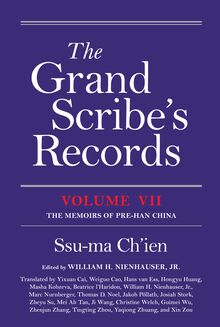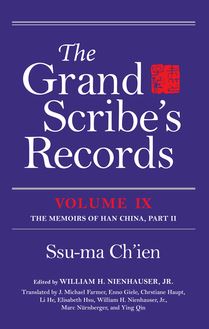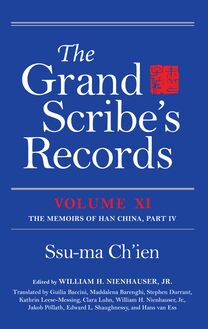-
 Univers
Univers
-
 Ebooks
Ebooks
-
 Livres audio
Livres audio
-
 Presse
Presse
-
 Podcasts
Podcasts
-
 BD
BD
-
 Documents
Documents
-
- Cours
- Révisions
- Ressources pédagogiques
- Sciences de l’éducation
- Manuels scolaires
- Langues
- Travaux de classe
- Annales de BEP
- Etudes supérieures
- Maternelle et primaire
- Fiches de lecture
- Orientation scolaire
- Méthodologie
- Corrigés de devoir
- Annales d’examens et concours
- Annales du bac
- Annales du brevet
- Rapports de stage
La lecture à portée de main
Vous pourrez modifier la taille du texte de cet ouvrage
Découvre YouScribe en t'inscrivant gratuitement
Je m'inscrisThe Grand Scribe's Records, Volume IX , livre ebook
Découvre YouScribe en t'inscrivant gratuitement
Je m'inscrisEn savoir plus
Vous pourrez modifier la taille du texte de cet ouvrage
En savoir plus

Description
An essential source for early Chinese history
This volume of The Grand Scribe's Records includes the second segment of Han-dynasty memoirs and deals primarily with men who lived and served under Emperor Wu (r. 141–87 B.C.). The lead chapter presents a parallel biography of two ancient physicians, Pien Ch'üeh and Ts'ang Kung, providing a transition between the founding of the Han dynasty and its heyday under Wu. The account of Liu P'i is framed by the great rebellion he led in 154 B.C. and the remaining chapters trace the careers of court favorites, depict the tribulations of an ill-fated general, discuss the Han's greatest enemy, the Hsiung-nu, and provide accounts of two great generals who fought them. The final memoir is structured around memorials by two strategists who attempted to lead Emperor Wu into negotiations with the Hsiung-nu, a policy that Ssu-ma Ch'ien himself supported.
Acknowledgments
Introduction: Herodotus and Ssu-ma Ch'ien: A Preliminary Study of Styles and Sources in Their Early Chapters
On Using This Book
Weights and Measures
List of Abbreviations
Memoir 45
Memoir 46
Memoir 47
Memoir 48
Memoir 49
Memoir 50
Memoir 51
Memoir 52
Frequently Mentioned Commentators
Biographical Sketches of Shih chi Scholars
Selected Recent Works on the Shih Chi
Index
Sujets
Informations
| Publié par | Indiana University Press |
| Date de parution | 01 août 2019 |
| Nombre de lectures | 0 |
| EAN13 | 9780253048400 |
| Langue | English |
| Poids de l'ouvrage | 7 Mo |
Informations légales : prix de location à la page 0,0100€. Cette information est donnée uniquement à titre indicatif conformément à la législation en vigueur.
Extrait
The Grand Scribe s Records
VOLUME IX
The Memoirs of Han China, Part II
The Grand Scribe s Records
VOLUME IX
The Memoirs of Han China, Part II
by Ssu-ma Ch ien
William H. Nienhauser, Jr.
Editor
J. Michael Farmer, Enno Giele, Christiane Haupt,
Li He, Elisabeth Hsu, William H. Nienhauser, Jr.,
Marc N rnberger, and Ying Qin
Translators
INDIANA UNIVERSITY PRESS
NANJING UNIVERSITY PRESS
This book is a copublication of
Indiana University Press
Office of Scholarly Publishing
Herman B Wells Library 350
1320 East 10th Street
Bloomington, Indiana 47405 USA
iupress.indiana.edu
and
Nanjing University Press
22 Hankou Road
Nanjing, Jiangsu, China
2011 by William H. Nienhauser, Jr.
2019 by William H. Nienhauser, Jr.
All rights reserved
No part of this book may be reproduced or utilized in any form or by any means, electronic or mechanical, including photocopying and recording, or by any information storage and retrieval system, without permission in writing from the publisher. The paper used in this publication meets the minimum requirements of the American National Standard for Information Sciences-Permanence of Paper for Printed Library Materials, ANSI Z39.48-1992.
Manufactured in the United States of America
Originally cataloged by the Library of Congress as Ssu-ma Ch ien, ca. 145-ca. 86 BC
[Shih chi. English]
The grand scribe s records / Ssu-ma Ch ien William H. Nienhauser, Jr., editor Giulia Baccini [et al.], translators.
p. cm.
Includes bibliographical references and index.
Contents: v. 1. The basic annals of pre-Han china
ISBN 0-253-34021-7
1. China-History-To 221 BC 2. China-History-Ch in dynasty, 221-207 BC. 3. China-History-Han dynasty 202 BC-220 CE
I. Nienhauser, William H. II. Cheng, Tsai Fa. III. Title.
DS741.3.S6813 1994
931-dc20 094-18408
ISBN 978-0-253-04609-3
1 2 3 4 5 24 23 22 21 20 19
THIS VOLUME IS DEDICATED TO
Alexander von Humboldt (1769-1859)
CONTENTS
Acknowledgments
Introduction: Herodotus and Ssu-ma Ch ien: A Preliminary Study of Styles and Sources in Their Early Chapters
On Using This Book
Weights and Measures (Lu Zongli)
List of Abbreviations
Memoir 45 (Elisabeth Hsu and William H. Nienhauser, Jr., translators)
Memoir 46 (Marc N rnberger, translator)
Memoir 47 (William H. Nienhauser, Jr., translator)
Memoir 48 (Li He and Ying Qin, translators)
Memoir 49 (Enno Giele, translator)
Memoir 50 (Enno Giele, translator)
Memoir 51 (J. Michael Farmer, translator)
Memoir 52 (Christiane Haupt, translator)
Frequently Mentioned Commentators
Biographical Sketches of Shih chi Scholars (Ho Tz u-ch n and Sung Y n-pin)
Index
Acknowledgments
Like most other volumes of this translation project, a substantial debt is owed to the Alexander-von-Humboldt Foundation for its continued support. Chapters 109, 110, and 112 were completed several years ago when our German Group was active in Munich supported in part by the Foundation. Chapter 106 and 107 were both partially completed with these funds. Moreover, the cooperation that the German Shih chi Group fostered has continued in various other forms. This volume is therefore dedicated to the great explorer and scholar Alexander von Humboldt (1769-1859).
During the final several Humboldt sojourns our mentor in Germany was Hans van Ess. His role in helping to shape this volume and the preceding volume 8 has been vital. I should also like to thank the translators, who currently occupy posts from Arizona to Oxford and from Munich to Madison, for their skillful renditions and their practiced patience. Some of these manuscripts have waited nearly seven years to find their way into print.
This volume is published under sponsorship with the Council for Cultural Affairs, R.O.C., which came to our aid at a crucial point in the translation and editing of these chapters. The Council s funding also enabled us to employ the skills of an old friend and former key member of our Group, Scott W. Galer, who typeset everything between these covers and offered sagacious advice on preparing the final copy.
The Fifth International Workshop on the Shih chi , in part funded by a generous gift from Lena Dunn-Lo (in memory of Irving Yu-cheng Lo), took place in Madison from 22 to 24 August 2008. The guest-scholars were J. Michael Farmer, Enno Giele, Bruce Knickerbocker, Zongli L , and Marc N rnberger, who respectively took the lead in discussing the draft translations of chapters 106, 107, 108, and 111.
As usual, the introductory pages were the last to be written. I am grateful to Barry Powell, who patiently lead me through Herodotus and offered numerous other sagacious suggestions on the comparison between the two great historians that opens the volume.
Once again, Teresa Nealon kept our finances, travels, workshops and spirits on track. On the home front another room has been donated to the Shih chi efforts-thanks Judith!
William H. Nienhauser, Jr.
24 October 2009
Introduction
Herodotus and Ssu-ma Ch ien: A Preliminary Study of Styles and Sources in Their Early Chapters
No picture, then, and no history, can present us with the whole truth: but those are the best picture and the best historians which exhibit parts of the truth as most nearly produce the effects of the whole.
-Thomas Babington Macaulay (1800-1859)
It is funny, but it strikes me that a person without anecdotes that they nurse while they live, and that survive them, are more likely to be utterly lost not only to history but the family following them. Of course, this is the fate of most souls, reducing entire lives, no matter how vivid and wonderful, to those sad black names on withering family trees, with have a date dangling after and a question mark
-Sebastian Barry, The Secret Scripture
I. Introduction
The two great historians of East and West, Herodotus ( H r dotos , ca. 484-ca. 425 B.C.) and Ssu-ma Ch ien ( ,145-ca. 86 B.C.), have been compared many times in the past. 1 There are of course obvious differences: Herodotus focuses his Histories to the conflicts between the Greeks and the Persians, whereas Ssu-ma s Grand Scribe s Records (Shih chi )is an account of all known history up to his era. Moreover, their styles differ radically. Yet the similarities between them are striking. To begin with, their backgrounds are comparable. Herodotus hailed from Halicarnassus, on the coast of Asia Minor near the frontier with the Persians; Ssu-ma Ch ien was from Han-ch eng , a provincial town near the border lands which the Hsiung-nu, the people just to the north of the Han-dynasty empire, often raided. Both men spent little time, however, in their hometowns, gathering much of their source material through conversations with people they met in their extensive travels. Each wrote only one major work and died shortly after completing it. Herodotus Histori (Inquiries) and the Shih chi (Records of the [Grand] Scribe) were the first complete histories in their respective cultures. Moreover, unlike the local character of most early histories in Greece (cities) and China (states), Herodotus and Ssu-ma Ch ien presented narrative accounts of their entire known world for the first time in their respective cultures.
Herodotus wove disparate materials into a single focus-the causes and effects of the wars with the Persians. Ssu-ma Ch ien took similarly diverse sources and shaped them into what some feel were reflections on the policies and politics of the single ruler under whom he spent most of his life, Han Wu-ti (r. 141-87 B.C.), focusing on those policies which dealt with the military methods the emperor employed against the Hsiung-nu.
Each man had his work criticized by an important successor-historian shortly after death (Thucydides, ca. 460-ca. 395 B.C., and Pan Ku, 32-92). Both Herodotus and Ssu-ma Ch ien were interested in the ethnography of neighboring peoples (especially Egypt and the Hsiung-nu). Both-from vastly different points of view-were interested in imperialism (as embodied in Darius and Xerxes of the Persians and Emperor Wu of the Han). 2
Even the motivations for compiling their respective works have strong affinities. Herodotus tells in the first line of his text that he presents his research so that human events do not fade with time. May the great and wonderful deeds-some brought forth by the Hellenes, others by the barbarians-not go unsung (1.1). 3 Ssu-ma Ch ien in his own postface admits that if I should permit the labors of the meritorious ministers, the feudal families, and the worthy officials to fall into oblivion and not be transmitted I could certainly be guilty of no greater sin , , 4 and in the first of his memoirs concludes that when the gentlemen of the cliffs and caves choose and reject [official positions], it is with such careful timing; when their names are buried and unspoken, it is sorrowful, isn t it? When men from village gates and lanes wish to polish their actions and establish their names, unless they attach themselves to a man of the highest rank, how can these [actions and names] reach later ages , , , , , ? ( GSR , 7:5-6; Shih chi , 61.2127). Finally, the historiographic talents of both of these writers have been questioned from earliest times. Indeed, having spent much of the last two decades in the company of Ssu-ma Ch ien, the question remains whether Ch ien can actually be considered historian in the modern sense of the word. A story-teller, a literary stylist, a courtier with strong allegiances to those imperials advisors who advocated restraint in fiscal and military matters, a man of great curiosity
-
 Univers
Univers
-
 Ebooks
Ebooks
-
 Livres audio
Livres audio
-
 Presse
Presse
-
 Podcasts
Podcasts
-
 BD
BD
-
 Documents
Documents
-
Jeunesse
-
Littérature
-
Ressources professionnelles
-
Santé et bien-être
-
Savoirs
-
Education
-
Loisirs et hobbies
-
Art, musique et cinéma
-
Actualité et débat de société
-
Jeunesse
-
Littérature
-
Ressources professionnelles
-
Santé et bien-être
-
Savoirs
-
Education
-
Loisirs et hobbies
-
Art, musique et cinéma
-
Actualité et débat de société
-
Actualités
-
Lifestyle
-
Presse jeunesse
-
Presse professionnelle
-
Pratique
-
Presse sportive
-
Presse internationale
-
Culture & Médias
-
Action et Aventures
-
Science-fiction et Fantasy
-
Société
-
Jeunesse
-
Littérature
-
Ressources professionnelles
-
Santé et bien-être
-
Savoirs
-
Education
-
Loisirs et hobbies
-
Art, musique et cinéma
-
Actualité et débat de société
- Cours
- Révisions
- Ressources pédagogiques
- Sciences de l’éducation
- Manuels scolaires
- Langues
- Travaux de classe
- Annales de BEP
- Etudes supérieures
- Maternelle et primaire
- Fiches de lecture
- Orientation scolaire
- Méthodologie
- Corrigés de devoir
- Annales d’examens et concours
- Annales du bac
- Annales du brevet
- Rapports de stage








